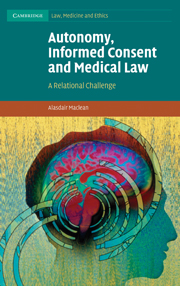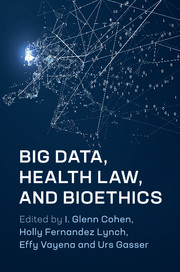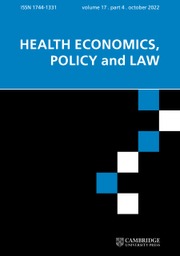Beyond Autonomy
Limits and Alternatives to Informed Consent in Research Ethics and Law
$41.99 (C)
Part of Cambridge Bioethics and Law
- Editors:
- David G. Kirchhoffer, Australian Catholic University
- Bernadette J. Richards, University of Adelaide
- Date Published: July 2021
- availability: Available
- format: Paperback
- isbn: 9781108741309
$
41.99
(C)
Paperback
Other available formats:
Hardback, eBook
Looking for an examination copy?
This title is not currently available for examination. However, if you are interested in the title for your course we can consider offering an examination copy. To register your interest please contact [email protected] providing details of the course you are teaching.
-
Respect for autonomy has become a fundamental principle in human research ethics. Nonetheless, this principle and the associated process of obtaining informed consent do have limitations. This can lead to some groups, many of them vulnerable, being left understudied. This book considers these limitations and contributes through legal and philosophical analyses to the search for viable approaches to human research ethics. It explores the limitations of respect for autonomy and informed consent both in law and through the examination of cases where autonomy is lacking (infants), diminished (addicts), and compromised (low socio-economic status). It examines alternative and complementary concepts to overcome the limits of respect for autonomy, including beneficence, dignity, virtue, solidarity, non-exploitation, vulnerability and self-ownership. It takes seriously the importance of human relationality and community in qualifying, tempering and complementing autonomy to achieve the ultimate end of human research - the good of humankind.
Read more- Offers a multidisciplinary and interdisciplinary exploration of the limits of respect for autonomy in human research ethics and the search for solutions
- Engages with concrete historical and recent cases in human research ethics
- Boasts an international list of contributors who are expert in their fields and who have practical experience in human research ethics governance and policy-making
Reviews & endorsements
'The strength of this volume is its timeliness and humanistic core, as manifested in the deep concern for the good of humankind, which must serve, the authors agree, as the goal of human research. This book is recommended for scholars and practitioners interested in bioethics, legal studies, and research methodologies and regulation.' M. Uebel, Choice
Customer reviews
Not yet reviewed
Be the first to review
Review was not posted due to profanity
×Product details
- Date Published: July 2021
- format: Paperback
- isbn: 9781108741309
- length: 226 pages
- dimensions: 229 x 152 x 12 mm
- weight: 0.341kg
- contains: 5 tables
- availability: Available
Table of Contents
Introduction. The limits of respect for autonomy David G. Kirchhoffer
Part I. Exploring Problems of Respect for Autonomy in Bioethics, Law and Society:
1. Autonomy and the law: widely used, poorly defined Bernadette J. Richards
2. Lack of autonomy: debates concerning research involving children Thomas H. Murray
3. Diminished autonomy: consent and chronic addiction Steve Matthews and Jeanette Kennett
4. Compromised autonomy: social inequality and issues of status and control S. Stewart Braun
Part II. The Search for Alternative or Complementary Concepts Surrounding Autonomy:
5. Self-ownership in research ethics Garrett Cullity
6. Beneficence in research ethics David G. Kirchhoffer, Christi D. Favor and Christopher D. Cordner
7. Dignity, being and becoming in research ethics David G. Kirchhoffer
8. Virtues in research ethics: developing an empirically-informed account of virtues in biomedical research practice Justin Oakley
Part III. Beyond Autonomy: Turning to the Community to Protect the Individual:
9. Duties of shared membership in research ethics José Miola
10. Engaging communities in human research in the Global South Anita Ho
11. Reducing shared vulnerabilities to data misuse Wendy Rogers.
Sorry, this resource is locked
Please register or sign in to request access. If you are having problems accessing these resources please email [email protected]
Register Sign in» Proceed
You are now leaving the Cambridge University Press website. Your eBook purchase and download will be completed by our partner www.ebooks.com. Please see the permission section of the www.ebooks.com catalogue page for details of the print & copy limits on our eBooks.
Continue ×Are you sure you want to delete your account?
This cannot be undone.
Thank you for your feedback which will help us improve our service.
If you requested a response, we will make sure to get back to you shortly.
×





